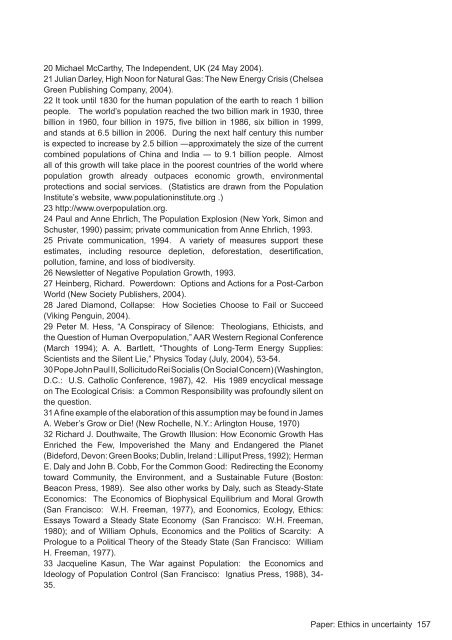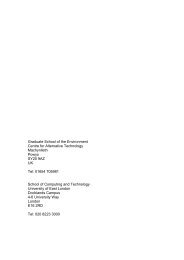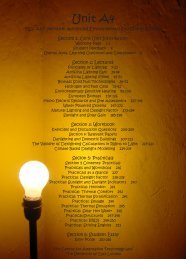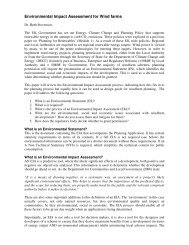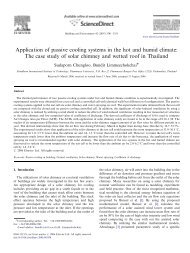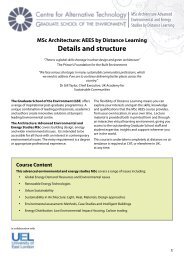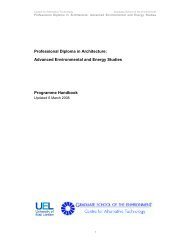Module B1 Study Book - the Graduate School of the Environment
Module B1 Study Book - the Graduate School of the Environment
Module B1 Study Book - the Graduate School of the Environment
You also want an ePaper? Increase the reach of your titles
YUMPU automatically turns print PDFs into web optimized ePapers that Google loves.
20 Michael McCarthy, The Independent, UK (24 May 2004).<br />
21 Julian Darley, High Noon for Natural Gas: The New Energy Crisis (Chelsea<br />
Green Publishing Company, 2004).<br />
22 It took until 1830 for <strong>the</strong> human population <strong>of</strong> <strong>the</strong> earth to reach 1 billion<br />
people. The world’s population reached <strong>the</strong> two billion mark in 1930, three<br />
billion in 1960, four billion in 1975, five billion in 1986, six billion in 1999,<br />
and stands at 6.5 billion in 2006. During <strong>the</strong> next half century this number<br />
is expected to increase by 2.5 billion ―approximately <strong>the</strong> size <strong>of</strong> <strong>the</strong> current<br />
combined populations <strong>of</strong> China and India ― to 9.1 billion people. Almost<br />
all <strong>of</strong> this growth will take place in <strong>the</strong> poorest countries <strong>of</strong> <strong>the</strong> world where<br />
population growth already outpaces economic growth, environmental<br />
protections and social services. (Statistics are drawn from <strong>the</strong> Population<br />
Institute’s website, www.populationinstitute.org .)<br />
23 http://www.overpopulation.org.<br />
24 Paul and Anne Ehrlich, The Population Explosion (New York, Simon and<br />
Schuster, 1990) passim; private communication from Anne Ehrlich, 1993.<br />
25 Private communication, 1994. A variety <strong>of</strong> measures support <strong>the</strong>se<br />
estimates, including resource depletion, deforestation, desertification,<br />
pollution, famine, and loss <strong>of</strong> biodiversity.<br />
26 Newsletter <strong>of</strong> Negative Population Growth, 1993.<br />
27 Heinberg, Richard. Powerdown: Options and Actions for a Post-Carbon<br />
World (New Society Publishers, 2004).<br />
28 Jared Diamond, Collapse: How Societies Choose to Fail or Succeed<br />
(Viking Penguin, 2004).<br />
29 Peter M. Hess, “A Conspiracy <strong>of</strong> Silence: Theologians, Ethicists, and<br />
<strong>the</strong> Question <strong>of</strong> Human Overpopulation,” AAR Western Regional Conference<br />
(March 1994); A. A. Bartlett, “Thoughts <strong>of</strong> Long-Term Energy Supplies:<br />
Scientists and <strong>the</strong> Silent Lie,” Physics Today (July, 2004), 53-54.<br />
30 Pope John Paul II, Sollicitudo Rei Socialis (On Social Concern) (Washington,<br />
D.C.: U.S. Catholic Conference, 1987), 42. His 1989 encyclical message<br />
on The Ecological Crisis: a Common Responsibility was pr<strong>of</strong>oundly silent on<br />
<strong>the</strong> question.<br />
31 A fine example <strong>of</strong> <strong>the</strong> elaboration <strong>of</strong> this assumption may be found in James<br />
A. Weber’s Grow or Die! (New Rochelle, N.Y.: Arlington House, 1970)<br />
32 Richard J. Douthwaite, The Growth Illusion: How Economic Growth Has<br />
Enriched <strong>the</strong> Few, Impoverished <strong>the</strong> Many and Endangered <strong>the</strong> Planet<br />
(Bideford, Devon: Green <strong>Book</strong>s; Dublin, Ireland : Lilliput Press, 1992); Herman<br />
E. Daly and John B. Cobb, For <strong>the</strong> Common Good: Redirecting <strong>the</strong> Economy<br />
toward Community, <strong>the</strong> <strong>Environment</strong>, and a Sustainable Future (Boston:<br />
Beacon Press, 1989). See also o<strong>the</strong>r works by Daly, such as Steady-State<br />
Economics: The Economics <strong>of</strong> Biophysical Equilibrium and Moral Growth<br />
(San Francisco: W.H. Freeman, 1977), and Economics, Ecology, Ethics:<br />
Essays Toward a Steady State Economy (San Francisco: W.H. Freeman,<br />
1980); and <strong>of</strong> William Ophuls, Economics and <strong>the</strong> Politics <strong>of</strong> Scarcity: A<br />
Prologue to a Political Theory <strong>of</strong> <strong>the</strong> Steady State (San Francisco: William<br />
H. Freeman, 1977).<br />
33 Jacqueline Kasun, The War against Population: <strong>the</strong> Economics and<br />
Ideology <strong>of</strong> Population Control (San Francisco: Ignatius Press, 1988), 34-<br />
35.<br />
Paper: Ethics in uncertainty 157


